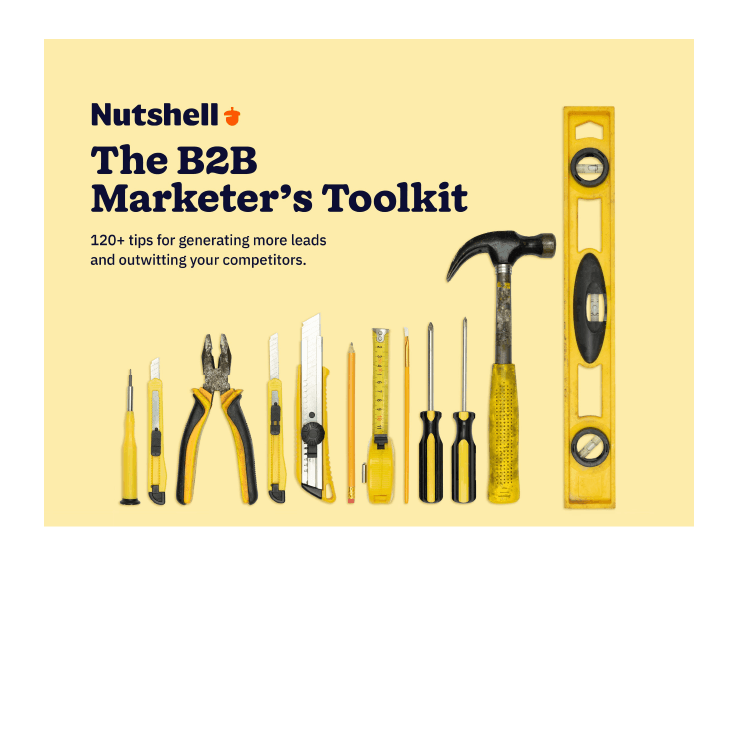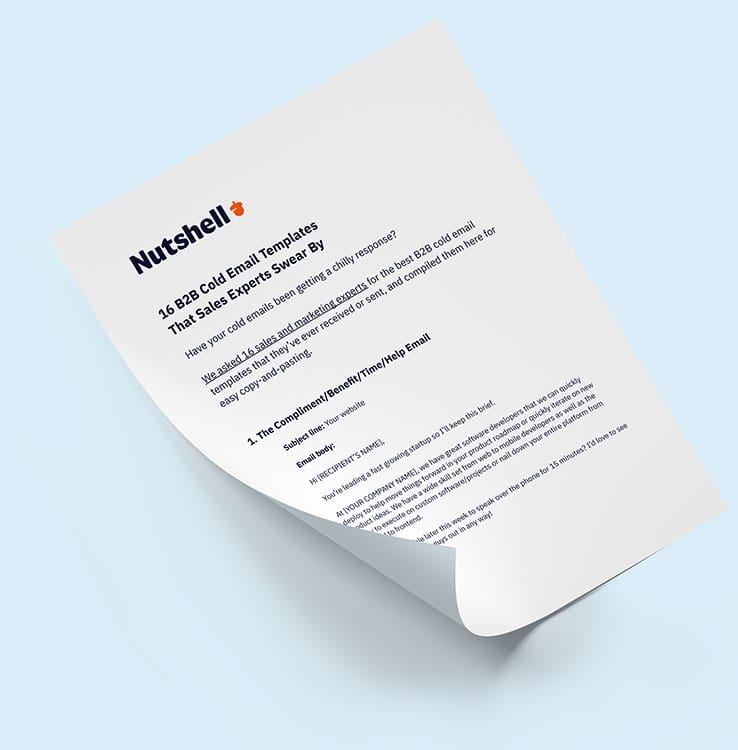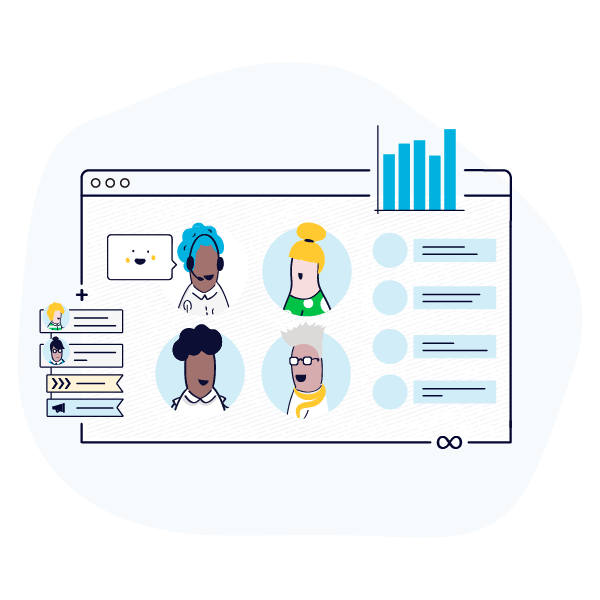
Customer relationship management (CRM) brings multifaceted benefits to your company and its various departments. Especially when it comes to the impact of CRM on the customer lifecycle—the possibilities are endless.
But CRM does more than just support your customer service team. In this article, we give you the inside scoop on how CRMs impact marketing, sales, and customer service teams to help your business thrive.
Interested in implementing CRM into your business strategy today? Get in touch with your friends at Nutshell today to start a free trial of our all-in-one CRM or attend a live demo.
The B2B Marketer’s Toolkit collects 120+ of the best lead generation tips ever published on the Nutshell blog. Download it today!

The customer lifecycle is the journey a customer takes from when they first interact with your brand to after they make a purchase. There are five basic stages to the customer lifecycle:
Though there are five stages, the customer lifecycle is nonlinear. Rather than a one-off journey, you want your customers to continuously circulate through the lifecycle and become loyal customers.
CRM is an invaluable tool when it comes to the customer lifecycle. Your CRM gives you insight into the habits of your leads and customers, helping you to paint a more detailed picture of your customer base. With it, you can map your customers’ journey and identify things like:
Understanding the details of your customer lifecycle puts you on the path toward better managing your leads within your sales pipeline and converting more leads through well-timed, top-notch customer service.
Our interactive worksheet compares the benefits offered by Nutshell, your existing contact management solution, and any other CRMs you’re currently evaluating.

When it comes to sales, marketing, and customer service, CRMs can bring a few different benefits to your brand that make it an incredible asset to have.
The role of CRM in marketing is quite simple: it’s your inside man. Your CRM is constantly collecting valuable customer data through interactions online and with your sales team.
With this information, you’ve got the inside scoop on your target audience’s habits, behaviors, likes, dislikes, etc. Using this data, you can create more targeted marketing campaigns that appeal to your ideal customer, resulting in higher conversion rates.
Rather than bombarding your leads and customers with generic ad and email campaigns that lack flair, you can create and launch targeted campaigns that are personalized toward different segments of your audience.
Not only does this help your conversion rates, but it makes your customer feel valued. Even just personalizing an email ad with a person’s name can make the recipient feel as though you’re looking out for each of your customers. In turn, that person could give you unmatched brand loyalty that keeps your sales on the up and up.
With enhanced marketing techniques that better appeal to your audience, you have the potential to boost your sales. Who doesn’t love that?
Did you know that CRM applications can help increase a business’s sales by up to 29% and even improve sales forecast accuracy by 42%? A CRM system helps you get a clearer picture of your current sales efforts and their results, allowing you to make well-informed decisions about improving how you sell to your customer base.
Accurate sales forecasting can help marketers and sales reps better understand how current marketing efforts could affect future sales and adjust strategies accordingly.
Just like marketing, the role of a CRM in customer service is to act as the inside man. With information about all your leads and customers on hand, your customer service and sales representatives can deliver quality customer service to each and every person they talk to.
Not only that but with customer information just a click away, each customer interaction is personalized, making for a memorable, positive experience that customers will associate with your brand for a long time.
Join 30,000+ other sales and marketing professionals in signing up for our free Sell to Win newsletter!

Your CRM system plays a vital role in influencing the customer lifecycle across every stage. While many CRM features can significantly impact the overall customer experience, these features lie at the heart of it.
A CRM platform’s contact management features let you manage and organize all your customer data in a centralized system. This gives you greater control over your data quality and allows for easy access to customer information across departments.
Housing all your data in one place through an efficient system also ensures a consistent customer experience at all touchpoints—Everyone at your company has access to the same data when a customer calls.
Communication is easier through CRM email sync and integrations for phone and virtual meeting apps. You can communicate with customers and colleagues directly from your CRM and see a detailed timeline of all interactions.
With Nutshell, you can include tags for easy lead, company, and contact data filtering. You can also add notes to highlight important information, use native AI tools to summarize data, and take fast and accurate notes with AI voice-to-text technology.
Most modern CRM solutions include sales automation features that automatically execute specific tasks according to the triggers and parameters you set. This reduces the time spent on highly repetitive administrative tasks and gives your team more time to focus on their core responsibilities.
Sales automation tools can streamline lead capture and nurturing, helping sales teams move leads through the pipeline. They help you structure your pipeline in a way that ensures your team knows exactly which action to take next.
These automation features include personal email sequences to make communication with prospects and leads more efficient. Sales reps have the ability to set up email templates and sequences to follow up with leads and stay in touch, keeping the conversation going.
Nutshell’s sales automation features also help teams evaluate their sales funnel’s health and pinpoint improvement areas. With it, teams can quickly identify pipeline stages with high lead advancement rates and those needing attention.
If you’re a Nutshell user, you’ll automatically have access to some useful marketing automation tools. However, advanced CRM marketing automation features typically come as an add-on with various capabilities.
Most CRM marketing tools include email marketing features with powerful audience segmentation and targeting capabilities. These tools make for efficient marketing outreach and communications, offering personalized interactions that foster customer loyalty.
Choosing Nutshell means gaining access to a host of valuable marketing tools, including creating automated drip campaigns using professional email templates and an easy-to-use drag-and-drop email builder.
Nutshell also lets you run email A/B tests and track email engagement through Nutshell’s email marketing reporting dashboard.
A CRM’s reporting and analytics tools give you insight into sales performance, team productivity, customer behavior, and more. You can use these reports to analyze strengths and weaknesses and enhance your sales, marketing, and support strategies.
Another important reporting function is the ability to forecast sales and revenue. A CRM like Nutshell uses historical data and market intelligence to run a predictive analysis and provide realistic estimates for better planning.
Nutshell also provides users with several standard one-click report structures and offers the ability to create custom reports that are more in tune with your business needs. You can create eye-catching reports and charts in Nutshell and easily download and share them.
Nutshell has what you’re looking for.

There’s no automatic guarantee that your CRM will drive sales and revenue—you must assess your sales data to see what kind of return on investment (ROI) you’re getting. That allows you to reoptimize CRM if the results aren’t what you want.
You can use a few different methods to measure your CRM’s impact on sales and revenue. By employing each of these measurement methods, you can use the insights gained to increase your sales.
Analyzing sales data is one of the first ways of measuring a CRM’s impact on sales and revenue. Of course, you can use the CRM itself to compile and view this data. Most CRMs let you create sales reports to track your sales progress using different metrics.
You can view your sales progress over time and match that timeline to what you’ve done with your CRM. Each time you change your CRM workflow, see what happens with your sales. If you make a change to your CRM and sales skyrocket, it could indicate that the change was a positive one.
You can collect many different types of sales data in your CRM, including:
By analyzing this data, you can get a clear picture of your CRM’s impact on your sales. If your sales are much lower than you’d like, it could be because you need to reoptimize your CRM to be more effective. That’s important for increasing the success of your business.
It’s not just your sales that matter when it comes to your CRM—the revenue impact of CRM is equally important. Though revenue and sales are indeed connected, they aren’t exactly the same, and you measure them in slightly different ways.
One of the best ways of measuring your CRM’s effectiveness is to track ROI. ROI is a metric that compares how much money you spend on your CRM to how much money the CRM brings in through revenue. After all, CRMs cost money, so you have to ensure that yours drives an overall profit.
You should be able to easily track your revenue right in your CRM, even attributing all of your revenue to each corresponding campaign. Needless to say, you want your total CRM-driven revenue to be significantly higher than the cost of the CRM.
In addition to looking at sales and revenue, it’s helpful to see how effective your CRM is at improving your marketing. Measuring sales is essential, but the only way people will get to that stage in the first place is if you successfully market to them. Your CRM can help with that.
In some cases, you may run marketing campaigns directly through your CRM—for example, many CRMs come with email marketing features. But even some of the campaigns run through other tools may still be based on data insights from your CRM. All of those marketing efforts depend on the effectiveness of your CRM.
Because of that, tracking your marketing campaigns can teach you a lot about what your CRM is doing for your business. You can track metrics like:
You can track at least several of these metrics directly in your CRM. By examining them, you can identify the most effective campaigns and optimize future campaigns based on what worked well in the successful ones. If you notice any significant issues, reoptimizing your CRM workflow could be one way to help fix them.
Once you’ve finished measuring the impact of CRM on sales and revenue, you may find that it’s not performing quite as well as you’d like. Or, even if it is, you may still want to improve its performance even more.
That’s where reoptimization enters the picture. You can use the data in your CRM and the insights you gain from that data to determine the best ways of optimizing your CRM to drive more sales and revenue. For example, you might find that you could benefit from better segmenting your audience in your CRM.
By implementing the tactics that have driven successful results in the past and improving on any issues you find, you can help make your CRM a far more successful tool for your company.
The benefits of CRM don’t stop at better sales, customer service, and marketing—Nutshell’s CRM can improve your entire work environment by promoting better team coordination, cooperation, organization, and productivity.
Nutshell includes plenty of sales automation and reporting features and comes with a top-tier customer support team to help you with any issues or questions you might have.
Experience Nutshell’s many benefits firsthand when you implement our intuitive CRM into your marketing, sales, and customer service strategies by starting a 14-day free trial today!
Most small to mid-sized businesses can implement a CRM in 30-45 days with proper planning. Basic setup takes 1-2 weeks, data migration and customization require 2-3 weeks, and team training needs another 1-2 weeks for full adoption.
CRM delivers an average ROI of $8.71 for every $1 spent. Small businesses typically see 29% sales revenue increase, up to 300% improvement in lead conversion rates, and 27% better customer retention within the first year.
CRM automation saves sales reps 2+ hours daily by automating data entry, follow-up reminders, and lead scoring. Marketing teams reduce campaign management time by 30%, while service teams resolve routine requests 50% faster with automated workflows.
CRM focuses on customer-facing processes like sales, marketing, and support to drive revenue. ERP manages back-office operations like finance, inventory, and HR. CRM stores customer interactions and deals; ERP handles transactions and resources.
Start with executive buy-in and clear goals. Designate department champions, provide role-specific training, and implement gradually—one team at a time. Track adoption metrics weekly and celebrate early wins to build momentum across the organization.
Give our powerful, easy-to-use CRM a try for free for 14 days! Or join a live demo to see Nutshell at work!

Join 30,000+ other sales and marketing professionals. Subscribe to our Sell to Win newsletter!